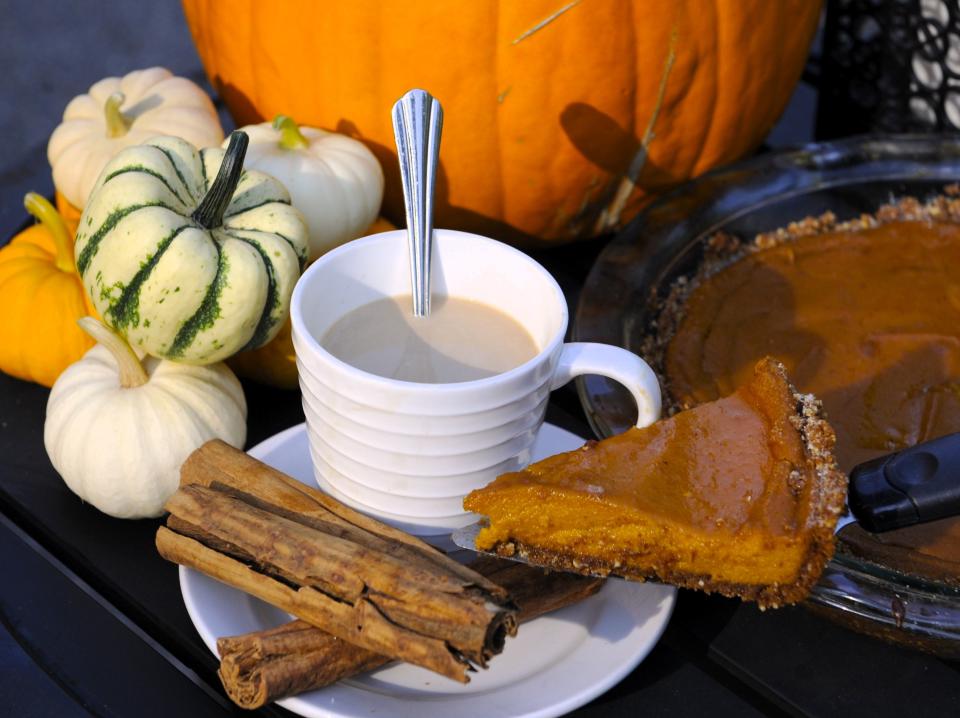What is it about pumpkin spice that makes people either love it, or hate it?
EVANSVILLE – Are we really still doing this?
It started 20 years ago with Starbucks’ first Pumpkin Spice Latte, and people are still brawling about whether pumpkin spice, the flavor that has crept out of the coffee cup and into everything from breakfast cereal to ramen noodles, is the perfect expression of fall or just perfectly disgusting.
When we asked friends why they thought pumpkin spice caused more polarization than other seasonal flavors − say, peppermint stick at Christmas − comments included:
More: Evansville-area food news: 8 bits of food news for you this week
“Because peppermint stick is not disgusting.”
“It’s become the ranch dressing of spice mixes, like how the bowl is the sweatpants of food presentation.”
“The demonization of pumpkin spice is the demonization of women and the things women like.”
“Maybe it’s just fun to diss it? I am amused by the dissing of Peeps.”
“Because it starts so early and ushers in the expensive and exhausting trifecta of holiday seasons.”
“This is the very definition of first-world problems.”
“Frankly my dear, I don’t give a damn.”

Quite a few people mentioned issues of gender. There have been articles (at Vox, and at the University of Western Ontario Gazette, for example) linking the backlash against pumpkin spice to sexism. Vox hints, however, that pumpkin spice lattes may be reverting to a simple chain coffee shop beverage that tired consumers want to sip in peace, and that haters are, at this point, going through the motions for lack of trollish ambition.
They haven’t, after all, gone after the upstart maple pecan flavors with any vigor at all. Then again, the article is from 2018 and we haven't tired of berating pumpkin spice drinkers yet.
We spoke with social psychologist Julie Eyink, assistant professor of psychology at the University of Southern Indiana, to dig deeper into the phenomenon of pumpkin spice.
She mentioned three social psychological principals that explained why pumpkin spice has such a hold on us.
Scarcity
You can’t get pumpkin spice all the time. It’s reactive − we want to run out and get that thing that is available for a limited time only.
“That’s part of the genius of it,” Eyink said. “You have to get it right now before it goes away.”
Social validation
Everyone does it so I should do it too − whether it’s friends or what you see on social media, you’ll tend to go along with a crowd.
This goes for positive or negative reactions toward something, but the more you see "your" people loving or hating it, the more you feel pressured to join in.
Mere exposure
“That’s an effect that says the more often you encounter something, the more positive you feel toward it,” Eyink explained. “As pumpkin spice has been more publicized and marketed, the more people will choose to interact with it. But if it’s too in your face all the time, it can cause a backlash, like a song that everyone likes that starts being played on the radio every five minutes and then everyone hates it.”
And the gender issue?
“There is a certain normist (female) gender feel of a fall aesthetic with certain fall clothes and so on, so people not in those normist groups could be pushing back against it,” Eyink said.
So that’s possibly why pumpkin spice is popular and why there has been a backlash, but it doesn’t explain why it is more loved and hated than other limited-time seasonal flavors which also are feminine (raspberry lemonade, I’m looking at you).
Maybe it’s because the seasonal shift that pumpkin spice marks is such a big one. Many people struggle with the heat and humidity of summer and long for the cooler days of fall. The appearance of pumpkin spice is a tangible token that the shift is happening. Others hate the cold, dark days of winter and despair to see them coming. The appearance of pumpkin spice is a tangible token of this, too.
On another positive note, the appearance of pumpkin spice marks the start of the most festive time in the Western calendar.
“There are positive feelings with the beginning of any new season, and there are great feelings of nostalgia attached to this season,” Eyink said. “The senses of scent and taste are strongly tied to our memories, so the taste of pumpkin spice can take you back to eating pumpkin pie with your grandma or other happy memories of seasons past.”
So what is it for you? Does the scent of pumpkin spice make you feel like you’re curled in a blanket on grandma’s couch after Thanksgiving dinner? Or does it remind you that soon you will be driving home from work in the dark slush at 5 p.m.? Or does it simply make you feel like you’ve just taken a bite of a scented candle?
This article originally appeared on Evansville Courier & Press: Why do we love (or hate) pumpkin spice?

